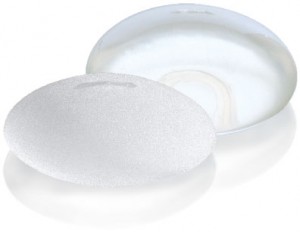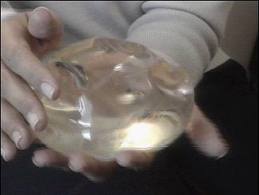 When the Food and Drug Administration allowed silicone gel-filled breast implants back on the market in November 2006, the agency required the manufacturers to conduct follow-up studies to learn more about the long-term performance and safety of the devices. on June 22, 2011, the FDA released a report that includes preliminary safety data from these studies, as well as other safety information from recent scientific publications and adverse events reported to FDA.
When the Food and Drug Administration allowed silicone gel-filled breast implants back on the market in November 2006, the agency required the manufacturers to conduct follow-up studies to learn more about the long-term performance and safety of the devices. on June 22, 2011, the FDA released a report that includes preliminary safety data from these studies, as well as other safety information from recent scientific publications and adverse events reported to FDA.
FDA approved silicone gel-filled breast implants for increasing breast size (augmentation) in women age 22 or older and for reconstruction (after breast cancer surgery or other medical issues) in all women. They are also approved for revision surgeries, which correct or improve the result of an original augmentation or reconstruction surgery.
Almost five years later, FDA’s report continues to support the safety and effectiveness of these implants when used as intended, but states that women should fully understand the risks before considering getting them.
- Breast implants are not lifetime devices. The longer a woman has them, the more likely she is to have complications and need to have the implants removed or replaced. Women with breast implants will need to monitor their breasts for the rest of their lives.
- The most frequently observed complications and adverse outcomes are tightening of the area around the implant (capsular contracture), additional surgeries, and implant removal. Other complications include a tear or hole in the outer shell (implant rupture), wrinkling, uneven appearance (asymmetry), scarring, pain, and infection.
Studies to date do not indicate that silicone gel-filled breast implants cause breast cancer, reproductive problems, or connective tissue disease, such as rheumatoid arthritis. However, no study has been large enough or long enough to completely rule out these and other rare complications. FDA is working with the two manufacturers who make silicone gel-filled breast implants, Allergan and Mentor, to address the challenges in collecting follow-up data on the women who have received these implants.
“It is important that women with breast implants who experience any symptoms see their health care providers,” says Jeffrey Shuren, M.D., J.D., director of FDA’s Center for Devices and Radiological Health. “Women who have enrolled in clinical studies should continue to participate so that we can better understand the long-term performance of these implants and identify any potential problems.”
FDA also provided other information on both silicone gel-filled and saline-filled breast implants:
- A redesigned website on breast implants
- A booklet, “Breast Implants: Local Complications and Adverse Outcomes”, which highlights the most common problems that occur with breast implants and things to consider before having breast implant surgery.
- A handout with questions to ask your surgeon before getting breast implants
FDA recommends that women with silicone gel-filled breast implants do the following:
Follow up. Continue to routinely follow up with your health care provider. Get routine MRIs to detect a rupture that you may not be aware of (silent rupture). FDA recommends that women with silicone gel-filled breast implants get screenings for silent ruptures three years after they get implants and every two years after that.
Be aware. Breast implants are not lifetime devices. The longer you have breast implants, the more likely you are to have complications. One in 5 patients who received implants for breast augmentation will need them removed within 10 years of implantation. For patients who received implants for breast reconstruction, as many as 1 in 2 will require removal within 10 years of implantation.
Pay attention to changes. Notify your health care provider if you develop any unusual signs or symptoms. Report any serious side effects to the breast implant manufacturer and MedWatch, FDA’s safety information and adverse event reporting program. Report online at www.fda.gov/MedWatch or by calling 800-332-1088.
Stay in touch. If you’re enrolled in a manufacturer-sponsored study, continue to participate. These studies are the best way to collect information about the long-term rates of complications.
 The U.S. Food and Drug Administration (FDA) this month approved the Natrelle 410 Highly Cohesive Anatomically Shaped Silicone-Gel Filled Breast Implant to increase breast size (augmentation) in women at least 22 years old and to rebuild breast tissue (reconstruction) in women of any age. Natrelle 410 implants are manufactured by Allergan, Inc.
The U.S. Food and Drug Administration (FDA) this month approved the Natrelle 410 Highly Cohesive Anatomically Shaped Silicone-Gel Filled Breast Implant to increase breast size (augmentation) in women at least 22 years old and to rebuild breast tissue (reconstruction) in women of any age. Natrelle 410 implants are manufactured by Allergan, Inc.
 When the Food and Drug Administration allowed silicone gel-filled breast implants back on the market in November 2006, the agency required the manufacturers to conduct follow-up studies to learn more about the long-term performance and safety of the devices. on June 22, 2011, the FDA released a report that includes preliminary safety data from these studies, as well as other safety information from recent scientific publications and adverse events reported to FDA.
When the Food and Drug Administration allowed silicone gel-filled breast implants back on the market in November 2006, the agency required the manufacturers to conduct follow-up studies to learn more about the long-term performance and safety of the devices. on June 22, 2011, the FDA released a report that includes preliminary safety data from these studies, as well as other safety information from recent scientific publications and adverse events reported to FDA. After an intensive review of known cases of a rare form of cancer in breast implant recipients, the Food and Drug Administration says women with implants may have a very small, but increased risk of developing anaplastic large cell lymphoma, or ALCL.
After an intensive review of known cases of a rare form of cancer in breast implant recipients, the Food and Drug Administration says women with implants may have a very small, but increased risk of developing anaplastic large cell lymphoma, or ALCL.